Legacies Read online
Page 8
Both the walls and the tower had a shiny, nacreous finish that reminded Una of polished sea shells; possibly a clue toward the Newcomers’ nature or technology? Loud, rumbling sounds, as might be made by heavy machinery, could be heard even at a distance. Corresponding vibrations rippled the scum-covered surface of the lake. The musty odor of the algae wafted off the water, leaving a bad taste in Una’s mouth and throat.
“Noisy,” Shimizu said. “Just a lot of loud equipment, or is there heavy construction under way?”
“Hard to say.” Una squinted at the citadel. “They could be expanding or reinforcing their outpost, or maybe that’s just what the citadel always sounds like. They could have very different hearing apparatus from us.”
“If they can hear at all,” Martinez said. “A Class-M environment often means fairly standard biology as well, but, then again, the Newcomers are not from around here.”
Una peered at the fortress through a pair of binoculars. “I’m not spying any individuals on the walls, but the architecture doesn’t appear Klingon to me.”
“Nor does it match up with any major spacefaring civilization known to the Federation.” Martinez examined the readouts on his tricorder. “The construction materials are highly exotic, too, and not likely to be native to this planet or even this sector. To be honest, I can’t even identify some of the materials involved. Whatever that citadel is made of, it didn’t come from Libros III . . . or any world in our computer library.”
“In other words, more mysteries.” She looked over at Martinez. “Can we tell how many life-forms are present in the citadel?”
“Negative.” He lowered his tricorder. “Our sensors can’t penetrate those walls, at least not at this distance.”
The lack of solid data frustrated Una. “Perhaps we should sneak closer?”
“That’s your call, Lieutenant,” Martinez said, frowning, “but—”
A familiar buzz, approaching the city from the south, caused the landing party to retreat back into the woods while still keeping their eyes on the citadel and the surrounding lake. They watched intently as the previously unseen aircraft passed over their heads and came into view.
A flying pod, perhaps slightly smaller than a Starfleet shuttlecraft, soared above them. Capsule-shaped, it sported two triangular wings that rose at forty-five-degree angles on its port and starboard sides. A polished iridescent hull glistened in the sunlight.
The pod glided over the lake toward the citadel. Watching from the cover of the forest, Una expected it to enter the city from above, but was surprised to see it dive into the lake instead, disappearing beneath the dull, colorless algae. The (obviously) amphibious craft had entered the water smoothly, making barely a splash.
“Huh?” Shimizu asked. “Where’d it go?”
“An underwater hangar?” Una speculated, putting down her binoculars. “I’m not seeing any visible gates or entrances above the waterline, at least not from this angle.”
Her theory gained strength as a second craft, distinguished by a larger carrying capacity and a somewhat more weathered hull, shot from the lake and took to the air, accelerating in the direction from which the first craft had come. It buzzed above the jungle canopy as it sped away from them.
“I agree,” Martinez said. “Looks like the only way in or out is underwater, which makes infiltrating that citadel a challenge, if we were so inclined. We can’t beam directly into it if we can’t see through those walls, so our only options are to try to scale the walls from the deck of a boat, coming back with a shuttlecraft . . . or making a swim for it.”
Just then, another of the hawk-sized dragonflies appeared from the jungle behind them and flew out low over the lake. Without warning, a blood-red tentacle burst from the water and grabbed onto the dragonfly before dragging its prey back beneath the water. The attack was over in a heartbeat, so that Una only caught a glimpse of barbed suckers lining the underside of the tentacle before the monstrous limb vanished from sight.
Shimizu gulped. “I vote against swimming.”
“I concur,” Martinez said, schooling his own startled features. “In my opinion, it’s too early to think about dropping by to say hello. This is just a preliminary scouting mission.” His gaze shifted from the lake to the sky and back again. “At least they don’t appear to have detected our presence yet, which is a big plus.”
Perhaps, Una thought, but she was frustrated by how little hard data they had acquired about the Newcomers so far. She had promised the captain facts, but those remained in short supply. How was April supposed to make any decisions unless they found out more about the Newcomers and their motives?
As the team continued to observe the citadel, another pod exited the lake and climbed into the sky. Una couldn’t tell if it was a third aircraft or the same one they’d seen before.
“Lots of coming and going,” Shimizu noted. “Wonder what all the traffic is about.”
Una mentally charted the pods’ projected trajectories, extrapolating from their apparent headings. “Orbital scans detected evidence of large-scale agricultural efforts in that direction. I suspect the crafts are going back and forth between the citadel and that location.”
“Makes sense to me.” Martinez turned away from the citadel and its secrets. “While we’re here, we should probably check out that site as well.”
“Definitely,” she agreed, remembering Commander Simon’s fears regarding the possible exploitation of the native Librosians. She didn’t want to return to the Enterprise without confirming or dispelling those concerns.
Shimizu glanced back the way they’d just traversed. “Too bad we didn’t come by shuttlecraft,” he said, clearly not looking forward to retracing their footsteps and then some. “How long of a hike are we talking about?”
Martinez was ready with the answer. “By my estimates, the other site is approximately six kilometers away. Through more of the forest, I’m afraid.”
Shimizu sighed. “Terrific.”
“I think we can skip that trek.” Una flipped open her communicator. Its raised lid doubled as an antenna. “I ought to check in with the ship.”
“Excuse me, Lieutenant,” Petty Officer James Cambias said. The security officer regarded the citadel warily. “What if the Newcomers pick up your transmission?”
Una paused to give the matter due consideration. “Good question, Mister Cambias,” she said after a moment’s thought, “but I think we can risk it. If they didn’t detect our transporter beam, and haven’t reacted to the Enterprise’s arrival yet, I doubt if a single communicator signal will set off alarms. Plus, the captain is waiting to hear from us.” She addressed Cambias and his fellow security officers. “Stay alert, just in case.”
He nodded. “Aye, sir.”
“Landing party to Enterprise,” Una said, raising her communicator to her lips. “Reporting.”
“Signal received, landing party.” She recognized the deep, gravelly voice of Spirit Claw Sanawey, the ship’s chief communications officer. “What is your status?”
“We have observed the alien citadel from a prudent distance,” Una stated, “and are now continuing our survey.”
“Acknowledged,” Captain April replied directly. “Thanks for checking in, Una. What’s next on your itinerary?”
“We’ve observed air traffic between the citadel and another site—” She glanced at Martinez, who handed her his tricorder with the relevant data on display. “—bearing fourteen degrees from our present location. Can you track that traffic to verify the precise location of the other site?”
“We’ll get right on that,” April promised. “In the meantime, have you made any new friends down there?”
“No, sir. We’re still exercising discretion on that front.”
“Glad to hear it.”
She directed the tricorder at the communicator in her other hand. “Transmitti
ng exterior scans of the citadel now.”
“Receiving data,” Sanawey reported.
There was a brief delay before April resumed communication. “All right, we’ve detected that air traffic you reported, which appears to connect sites all over the region. The nearest one is indeed approximately six kilometers from where you are now.”
Una gave Martinez an appreciative nod.
“Acknowledged,” she said. “Request point-to-point transfer to the site in question.”
“Permission granted,” April replied. “Find out what you can, Una.”
“That’s the plan, sir. Una out.”
She put away her communicator and barely had time to hand the tricorder back to Martinez before she felt the familiar tingle of the transporter begin to reduce her to atoms once more. Dissolving, she considered the mechanics of the operation; in theory, they would actually be returning to the ship momentarily, in the form of six discrete matter streams, before being beamed back to the planet, albeit six kilometers to the south.
Let’s hope this hop is worth the trip, she thought, and yields more in the way of usable data.
The transition from one part of the rain forest to another was less jarring than beaming down from the transporter room before. The general climate, time zone, and visuals remained the same, although she stumbled slightly as the transporter put her down on the slope of a wooded hillside; in the absence of another transporter station at the receiving end, the computer was programmed to pick out the most suitable landing spot available, but sometimes the target destination limited its options. Una quickly adjusted to the incline, finding better footing as she got her bearings.
The landing party had materialized on a hill overlooking what appeared to be a large, cultivated valley, approximately two hundred meters below. Descending rows of trees and underbrush obstructed her view, but she glimpsed activity and industry below. A smoky odor permeated the air, along with the recurring sound of timber crashing to the ground. She could also faintly hear a low, atonal warbling that she could not yet identify.
“Seriously?” Shimizu muttered a few paces away. He stood ankle-deep in a puddle of rainwater, shaking his head at his bad luck. “You don’t think one of the transporter operators has it in for me, do you?”
“I wouldn’t be at all surprised,” Martinez said, in what was quite possibly a joke. “Heads up, people. Stick close and keep quiet.”
They crept forward, clinging to the concealing shelter of the woods, to get a better look at the scene below. Una led the way again, anxious to discover the truth about what the Newcomers were up to.
What she beheld was just as dismal as she had feared.
Hectares of primeval forest had been cleared to make room for a sprawling agricultural operation that seemed designed to replace the indigenous greenery with ugly gray crops of alien origin. Water, diverted from a nearby river, irrigated vast fields of the invasive fungi that were apparently being grown as foodstuffs. The fields surrounded a central complex composed of silos, sheds, dormitories, greenhouses, a power plant of some sort, and a few structures Una couldn’t positively identify. Unlike the exotic, opalescent walls of the citadel, the buildings below appeared constructed of materials wrested from Libros III: hewn wood, quarried stone, cement, and so on. Cooling mist sprayed from the eaves of the buildings onto the pathways below, providing a degree of relief from the sun. Three pods, of varying colors and sizes, were parked on a small airfield next to the main complex, with possibly more stored in an adjacent hangar. The fungus farm seemed primitive compared to the citadel—or the Enterprise, for that matter—but it was far more ambitious and sophisticated than anything reported by the unmanned probes a decade before.
And seemingly dependent on forced labor.
Scores of native Librosians could be seen toiling beneath the unrelenting sun. Most were engaged in clearing yet more forest, felling trees with metal axes and saws, and burning the surviving vegetation to enrich the soil and make room for more alien crops. Crude slash-and-burn farming, Una realized, such as nearly destroyed the Amazon rain forests on Earth centuries ago and which had also reduced the fabled jungles of Chelana II to arid wastelands over the course of generations, causing the extinction of numerous unique life-forms. Smoke rose from the torched fields, as well as stacks of excess timber. Other Librosians tended to the growing fungi, uprooting any native weeds and nurturing the alien crops at the expense of the planet’s own ecology, while still more Librosians were engaged in a variety of menial tasks: performing simple maintenance on the buildings, toting bundles of supplies and equipment, and running fresh water to the parched loggers cutting down the forest.
All under the watchful gaze of the Newcomers.
There was no mistaking one species from another. Viewed from above, the Librosians matched their description in the Federation database, conforming to basic humanoid design, if somewhat smaller in stature than the galactic average. The tallest adults topped out at roughly one and a half meters in height. Longish arms swung low as they walked, in a vaguely simian manner. Largely nude, as was typical of tropical cultures, their unadorned skin was a dark tan, while jade-green hair matched the leafy canopy that had once sheltered them. Said hair had been cut short on both males and females, contrary to images recorded by the Federation probes years ago. A change in fashion, or a practicality imposed on them by the Newcomers in the interests in efficiency or uniformity?
Una suspected the latter.
It took her a moment to spot one of the Newcomers, who seemed few and far between compared to the teeming Librosian laborers. Then she noticed a strange alien being emerging from the base of a tall watchtower.
There you are, she thought. Finally.
Unlike the Librosians, the Newcomer was not remotely humanoid, looking more akin to gastropods. A smooth, nacreous environmental suit or exoskeleton shielded most of its form, but a damp, glistening head, complete with six pairs of sensory tentacles, sprouted from one end of its artificial shell, while a single rubbery foot propelled it forward by means of muscular contractions. A pair of jointed limbs, sheathed in metallic coils, protruded like arms from its upper body. Claspers, resembling a cross between fingers and filaments, could be seen at the end of the segmented metal extremities. It was unclear from this distance whether the limbs were entirely prosthetic or simply covered by protective sleeves and gloves.
“You gotta be kidding me,” Shimizu whispered. “Armored slugs?”
“So it appears,” Una said. Now that she knew what to look for, she spotted maybe a dozen other Newcomers overseeing the operations. They mostly kept in the shade and to the misted pathways, no doubt to avoid drying up. “And don’t judge them by their appearances. One of my best friends is an arachnid, remember?”
“I know, I know,” Shimizu said. “I like G’Sissol, too. But let’s be honest here. Do these look like good guys to you?”
No, she thought. They do not.
Una was appalled by the scene below. She found it hard to believe that the forest-dwelling Librosians were willingly slaving away to despoil their own environment. Beyond the evident oppression of the planet’s native inhabitants, she was troubled by the rampant deforestation and contamination of the rain forest. That same gray algae had already infested the diverted river and an irrigation system, while the alien fungi was obviously encroaching on the planet’s natural ecology, possibly with dire results. The Newcomers seemed intent on reshaping Libros III to their own liking—and were forcing the poor Librosians to assist in the colonization of their own world.
Her throat tightened at the tragedy unfolding before her eyes, which grew uncharacteristically moist. She wiped away a solitary tear.
The gesture did not go unnoticed by Martinez. “Everything okay, Lieutenant?”
“I’m fine,” she lied. “The smoke’s just bothering my eyes, that’s all.”
“Mine too,” he adm
itted.
Unsure what he meant by that, she hastily changed the subject. “The Newcomers appear to be making their mark on the planet and its ecology, almost as though they’ve embarked on a deliberate campaign of terraforming.”
“You know, I’ve never really thought that was the right word,” Shimizu said. “Terra refers to Earth, right? So if a non-terrestrial species is trying to re-create their own homeworld, should we actually call it terraforming? Why not vulcan-forming or andor-forming?”
She gave him a look. “Don’t be a pedant.”
Martinez surveyed the river valley. “I’m counting maybe a dozen Newcomers, tops, although it’s possible that there are more inside the buildings.”
“That strikes me as a rather small amount to oversee such a large work force,” Una observed. There were easily twenty times that many Librosians at work in the valley. “Even with their superior technology, I wonder how they manage to keep so many native Librosians under control.”
“I’m guessing it’s not pretty,” Shimizu said, “and not because they’re slugs.”
“We still don’t know for certain that we’re looking at forced labor here,” Martinez pointed out. “The Librosians could have been enticed or persuaded to cooperate with the Newcomers somehow.”
Una regarded the teeming laborers breaking their backs beneath the hot sun. She couldn’t make out their expressions, but she saw no evidence that the Librosians were going at their arduous chores with any sort of enthusiasm. Maybe she was simply projecting her own instinctive aversion to one species dominating another, but the activity below struck her as singularly joyless.
“Do you truly think that’s the case, Mister Martinez?” she asked. “That the Librosians aren’t being exploited?”
He shook his head. “No.”
A rustling came from a stand of leafy ferns growing in a patch of sunlight a few meters to the right. A fallen log, sprouting fresh growth from its carcass, provided a natural blind of sorts. Glancing toward the noise, which she assumed to be coming from some manner of wildlife, Una was surprised to see a pair of emerald eyes peering out at the landing party from behind the ferns. She quickly clamped down on her expression to keep from betraying her reaction. As casually as she could manage, she sidled closer to Martinez.

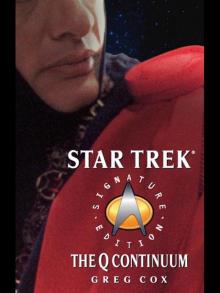 Q-Space
Q-Space Godzilla - the Official Movie Novelization
Godzilla - the Official Movie Novelization War for the Planet of the Apes: Official Movie Novelization
War for the Planet of the Apes: Official Movie Novelization Underworld: Evolution
Underworld: Evolution Underworld
Underworld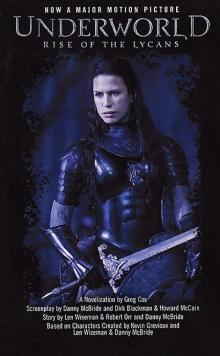 Rise of the Lycans
Rise of the Lycans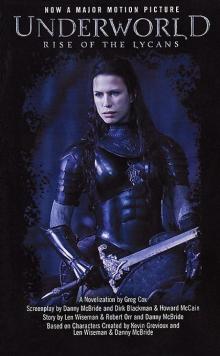 04 - Rise of the Lycans
04 - Rise of the Lycans X-Men and the Avengers: Search and Rescue
X-Men and the Avengers: Search and Rescue Child of Two Worlds
Child of Two Worlds Welcome to Promise City
Welcome to Promise City The Librarians and the Mother Goose Chase
The Librarians and the Mother Goose Chase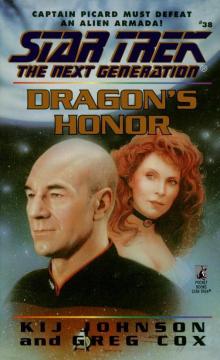 Dragon's Honor
Dragon's Honor 03 - Evolution
03 - Evolution DC Comics novels--Batman
DC Comics novels--Batman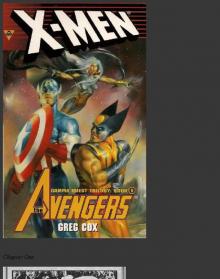 X-Men and the Avengers: Lost and Found
X-Men and the Avengers: Lost and Found Foul Deeds Will Rise
Foul Deeds Will Rise 02 - Blood Enemy
02 - Blood Enemy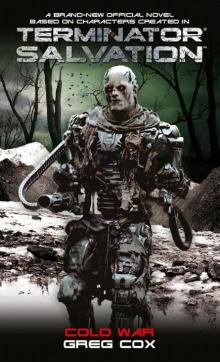 Terminator Salvation: Cold War
Terminator Salvation: Cold War The Weight of Worlds
The Weight of Worlds The Antares Maelstrom
The Antares Maelstrom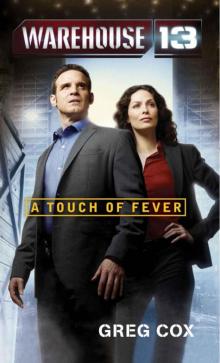 Warehouse 13: A Touch of Fever
Warehouse 13: A Touch of Fever Underworld: Blood Enemy
Underworld: Blood Enemy The Rise and Fall of Khan Noonien Singh
The Rise and Fall of Khan Noonien Singh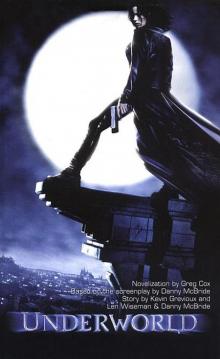 01 - Underworld
01 - Underworld The 4400- the Vesuvius Prophecy
The 4400- the Vesuvius Prophecy Assignment: Eternity
Assignment: Eternity The Eugenics Wars, Vol. 2: The Rise and Fall of Khan Noonien Singh
The Eugenics Wars, Vol. 2: The Rise and Fall of Khan Noonien Singh The Dark Knight Rises: The Official Novelization
The Dark Knight Rises: The Official Novelization The Bestseller Job
The Bestseller Job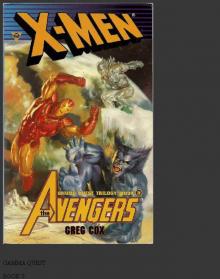 X-Men and the Avengers: Friend or Foe?
X-Men and the Avengers: Friend or Foe? Marvel Classic Novels--X-Men and the Avengers
Marvel Classic Novels--X-Men and the Avengers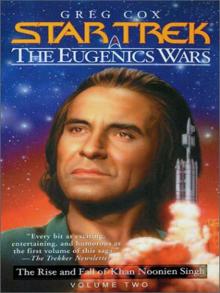 STAR TREK: TOS - The Eugenics Wars, Volume Two
STAR TREK: TOS - The Eugenics Wars, Volume Two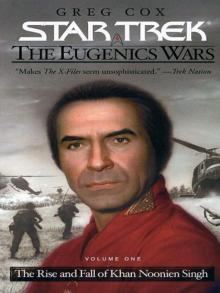 STAR TREK: TOS - The Eugenics Wars, Volume One
STAR TREK: TOS - The Eugenics Wars, Volume One The Black Shore
The Black Shore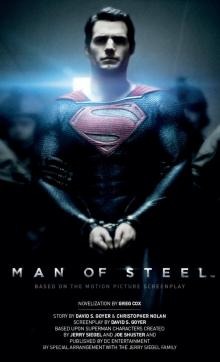 Man of Steel: The Official Movie Novelization
Man of Steel: The Official Movie Novelization Loose ends r-1
Loose ends r-1 Legacies
Legacies The Eugenics Wars, Volume Two
The Eugenics Wars, Volume Two Star Trek: The Original Series - 148 - The Weight of Worlds
Star Trek: The Original Series - 148 - The Weight of Worlds Star Trek: The Original Series: The Rings of Time
Star Trek: The Original Series: The Rings of Time Godzilla--The Official Movie Novelization
Godzilla--The Official Movie Novelization Star Trek: The Original Series - 160 - Foul Deeds Will Rise
Star Trek: The Original Series - 160 - Foul Deeds Will Rise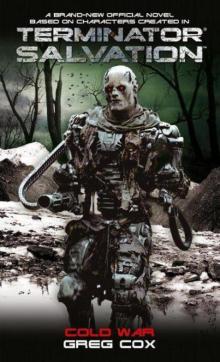 Terminator Salvation: Cold War ts-3
Terminator Salvation: Cold War ts-3 Star Trek: The Original Series: Miasma
Star Trek: The Original Series: Miasma Star Trek: The Original Series: No Time Like the Past
Star Trek: The Original Series: No Time Like the Past Child of Two Worlds (Star Trek: The Original Series)
Child of Two Worlds (Star Trek: The Original Series) THE 4400® WELCOME TO PROMISE CITY
THE 4400® WELCOME TO PROMISE CITY Star Trek: The Original Series: The Rings of Time (star trek: the original series)
Star Trek: The Original Series: The Rings of Time (star trek: the original series) To Reign in Hell: The Exile of Khan Noonien Singh
To Reign in Hell: The Exile of Khan Noonien Singh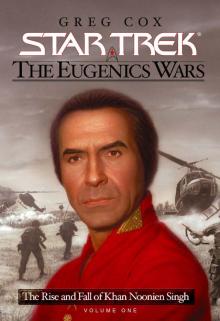 Star Trek: The Eugenics War, Vol. 1
Star Trek: The Eugenics War, Vol. 1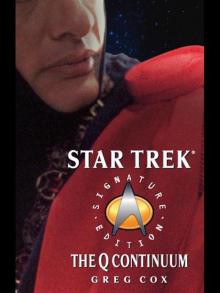 The Q Continuum
The Q Continuum